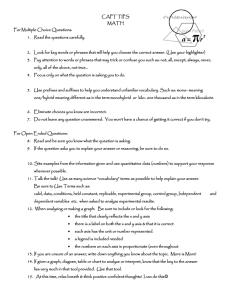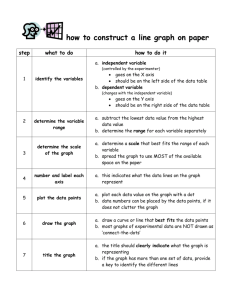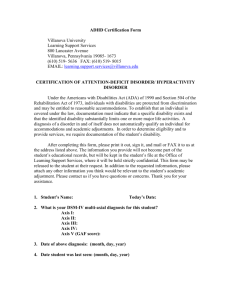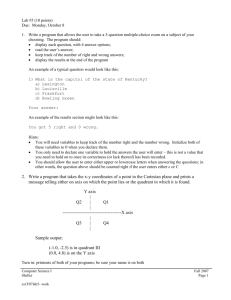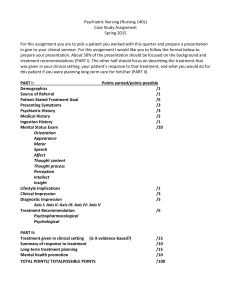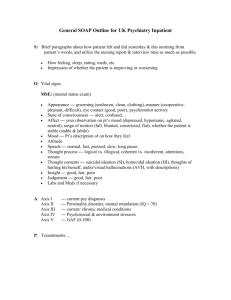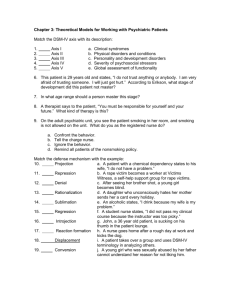Therapy and Treatment - McGraw Hill Higher Education
advertisement
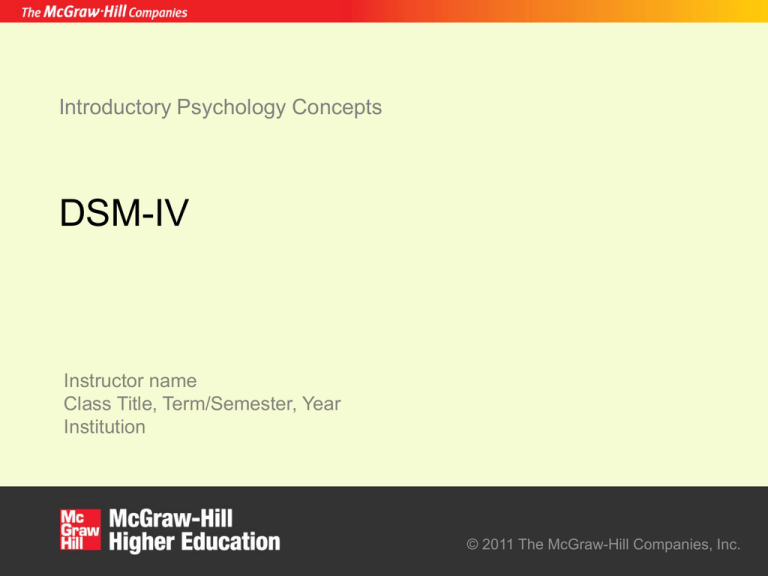
Introductory Psychology Concepts DSM-IV Instructor name Class Title, Term/Semester, Year Institution © 2011 The McGraw-Hill Companies, Inc. Introductory Psychology Concepts: DSM-IV The Diagnostic and Statistical Manual of Mental Disorders, Fourth Edition, Text Revision (DSM-IV-TR); • Created by American Psychiatric Association in 2000 via a task force of mental health professionals • The most widely used classification system in the United States. For each of its more than 350 diagnostic categories, the manual contains detailed lists of observable behaviors that must be present in order for a diagnosis to be made. 2 © 2011 The McGraw-Hill Companies, Inc. Introductory Psychology Concepts: DSM-IV The DSM Classification System The DSM-IV-TR uses a five-axis system to arrive at a comprehensive diagnosis that takes into account mental health and other relevant personal and environmental factors. DSM-IV-TR Diagnosis Axis I Panic disorder Axis II Dependent personality disorder Axis III High blood pressure (hypertension) Axis IV Severe stress (divorce, job loss) Axis V Serious symptoms: fair overall functioning 3 © 2011 The McGraw-Hill Companies, Inc. Axis I Primary diagnosis Introductory Psychology Concepts: DSM-IV The DSM Classification System The DSM-IV-TR uses a five-axis system to arrive at a comprehensive diagnosis that takes into account mental health and other relevant personal and environmental factors. DSM-IV-TR Diagnosis Axis I Panic disorder Axis II Dependent personality disorder Axis III High blood pressure (hypertension) Axis IV Severe stress (divorce, job loss) Axis V Serious symptoms: fair overall functioning 4 © 2011 The McGraw-Hill Companies, Inc. Axis II Personality disorders or mental retardation Introductory Psychology Concepts: DSM-IV The DSM Classification System The DSM-IV-TR uses a five-axis system to arrive at a comprehensive diagnosis that takes into account mental health and other relevant personal and environmental factors. DSM-IV-TR Diagnosis Axis I Panic disorder Axis II Dependent personality disorder Axis III High blood pressure (hypertension) Axis IV Severe stress (divorce, job loss) Axis V Serious symptoms: fair overall functioning 5 © 2011 The McGraw-Hill Companies, Inc. Axis III Relevant physical disorders Introductory Psychology Concepts: DSM-IV The DSM Classification System The DSM-IV-TR uses a five-axis system to arrive at a comprehensive diagnosis that takes into account mental health and other relevant personal and environmental factors. DSM-IV-TR Diagnosis Axis I Panic disorder Axis II Dependent personality disorder Axis III High blood pressure (hypertension) Axis IV Severe stress (divorce, job loss) Axis V Serious symptoms: fair overall functioning 6 © 2011 The McGraw-Hill Companies, Inc. Axis IV Intensity of psychosocial and environmental problems Introductory Psychology Concepts: DSM-IV The DSM Classification System The DSM-IV-TR uses a five-axis system to arrive at a comprehensive diagnosis that takes into account mental health and other relevant personal and environmental factors. DSM-IV-TR Diagnosis Axis I Panic disorder Axis II Dependent personality disorder Axis III High blood pressure (hypertension) Axis IV Severe stress (divorce, job loss) Axis V Serious symptoms: fair overall functioning 7 © 2011 The McGraw-Hill Companies, Inc. Axis V Global assessment of level of functioning (GAF)
